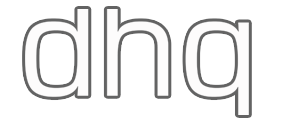About DHQ
Overview
Welcome to Digital Humanities Quarterly (DHQ), an open-access, peer-reviewed, digital journal covering all aspects of digital media in the humanities. Published by the Association for Computers and the Humanities (ACH) and the Alliance of Digital Humanities Organizations (ADHO), DHQ is also a community experiment in journal publication, with a commitment to:
- experimenting with publication formats and the rhetoric of digital authoring
- co-publishing articles with Literary and Linguistic Computing (a well-established print digital humanities journal) in ways that straddle the print/digital divide
- using open standards to deliver journal content
- developing translation services and multilingual reviewing in keeping with the strongly international character of ADHO
DHQ publishes a wide range of peer-reviewed materials, including:
- Scholarly articles
- Editorials and provocative opinion pieces
- Experiments in interactive media
- Reviews of books, web sites, new media art installations, digital humanities systems and tools
Materials published in DHQ appear in the Preview area as soon as they are ready, with announcements marking the release of each new issue, roughly at quarterly intervals.
DHQ in the Public Indexes
DHQ is indexed in the Clarivate Analytics "Emerging Sources Citation Index", which means that DHQ is indexed within Thomson Reuters' Web of Science. For more information about the Emerging Sources Citation index and an explanation of its significance for journals like DHQ, read more here. DHQ does not currently have Clarivate Analytics Impact Factor, although being part of this index moves us further in that direction. DHQ is also indexed in Google Scholar. DHQ has recently been accepted for indexing in Scopus, and this process should be complete by early 2019: after the indexing processes has been carried out we will have an official CiteScore generated by Scopus.
DHQ on Digital Humanities
Digital humanities is a diverse and still emerging field that encompasses the practice of humanities research in and through information technology, and the exploration of how the humanities may evolve through their engagement with technology, media, and computational methods. DHQ seeks to provide a forum where practitioners, theorists, researchers, and teachers in this field can share their work with each other and with those from related disciplines. In identifying the scope of DHQ, we define both "the humanities" and "the digital" quite broadly, and we invite contributions that probe the boundaries of the domain or re-examine its foundational premises. If you're unsure of whether a prospective submission falls within DHQ's rubric, please contact the editors.
Publishing Policies
All DHQ materials are published under an open-access license that gives authors permanent ownership of their work. DHQ retains a perpetual, non-exclusive right to publish the work and to include it in other aggregations and indexes to achieve broader impact and visibility. But authors are free to republish their work in any venue they choose; there are never any reprint fees and authors do not need DHQ's permission to reuse or reprint their work in any form.
DHQ maintains a Code of Ethics by which the journal is conducted.
Technical Overview
DHQ is published on the web using an open-source XML-based publication system. We accept submissions in a wide range of formats, and host all accepted submissions that do not require dedicated software on the server, while providing links to any that do. Submissions in traditional academic formats (essays, articles, book reviews, bibliographies and so forth) are encoded in a TEI-compatible format for longevity and ease of management, but we also welcome innovative and experimental forms of scholarship and criticism. In addition, our web platform will support the infrastructure for ongoing commenting on DHQ publications, ad hoc reviews of the literature, and the like. Our intent is to demonstrate and promulgate best practices in electronic text encoding conducive to long-term preservation and Internet-wide access, while simultaneously encouraging approaches that continue to push the boundaries of the possible.



